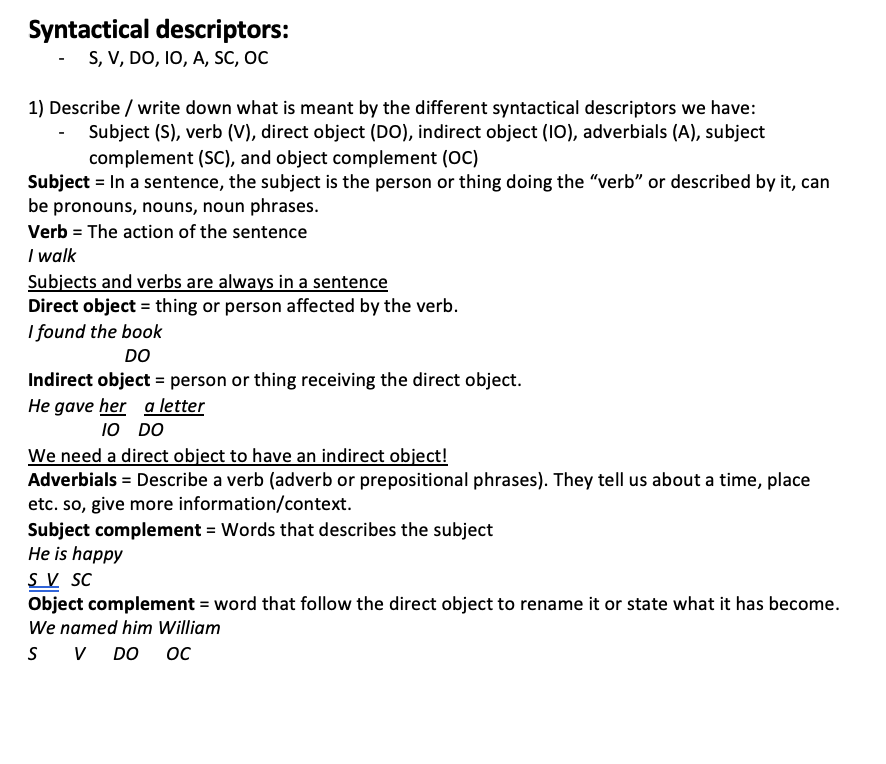AP
5.0(1)
5.0(1)
Card Sorting
1/43
Earn XP
Description and Tags
Study Analytics
Name | Mastery | Learn | Test | Matching | Spaced |
|---|
No study sessions yet.
44 Terms
1
New cards
Homonyms
Words that are spelled the same but have different meanings when they are pronounced the same
o Bark
o Fair
o Hide
o Jam
o Bark
o Fair
o Hide
o Jam
2
New cards
Homographs
Words that are spelled the same but have different meanings when they are pronounced differently
o Context
The violinist gave a bow and dropped his bow (First rhymes with cow, second with no)
Read the book. I read it yesterday.
o Context
The violinist gave a bow and dropped his bow (First rhymes with cow, second with no)
Read the book. I read it yesterday.
3
New cards
Homophones
Words that are spelled differently, as well as having a different meaning, same pronunciation
o Air Heir
o Bored Board
o Groan Grown
o Male Mail
o Deer Dear
o Air Heir
o Bored Board
o Groan Grown
o Male Mail
o Deer Dear
4
New cards
Common(count) nouns
Common nouns are generic. Non-specific ‘Planet’ is a common noun - could be one of many planets. Whereas ‘Jupiter’ is a proper noun. “My mother” is a common noun even though she is a specific mother.
- war, table, dog
- war, table, dog
5
New cards
Proper nouns
Proper nouns refer to people, places, or titles. More specific. Tend to start with a capital letter and stand alone without: a, an or the. “Mother” is a proper noun. Historical periods and events, the titles of natural phenomena (Hurricane Charlie) and specific geographical regions (the South of France) are all proper nouns.
- Camilla, Paris, Mr.
- Camilla, Paris, Mr.
6
New cards
Proper plurals
Proper nouns are not usually referred to in the plural, but if you have three friends called Emma, you might refer them as “the (three) Emmas”. More people with the same name. You might also say: “ I saw the Monets in the Louvre” - talking about his paintings.
- The Parises
- The Parises
7
New cards
Uncountable nouns
Uncountable nouns are a subgroup of common nouns and is known as non-count, uncountable or mass nouns, which do not take a singular or a plural. They cannot be measured by number. In order to give a quantity for these we have to say much, some, lot, a cupful (two cupfuls)
Word where the plural does not change
- Water, evidence, happiness and rice
Word where the plural does not change
- Water, evidence, happiness and rice
8
New cards
Concrete nouns
Concrete nouns are the names we give to things we can see, feel, bear, touch, smell
- trees, elephants, cake, and books
- trees, elephants, cake, and books
9
New cards
Abstract nouns
Abstract nouns tends to be non-countable, but there are a few exceptions such as time and structure: concrete nouns may or may not be countable: some rice (non countable), three kittens (countable.)
Abstract is thoughts, emotions and ideas
- tomorrow, thought, welfare, delight, belief
Abstract is thoughts, emotions and ideas
- tomorrow, thought, welfare, delight, belief
10
New cards
Foreign plurals
Borrowed words
- Criterion => Criteria,
Alga => Algea
- Criterion => Criteria,
Alga => Algea
11
New cards
Irregular nouns
We simply have to know them. Don’t follow any rules, Be careful with the noun hair. We always use this in the singular when referring to say “ a glorious head of hair”, but it becomes plural if we are talking about a small number. So, we would say “my grandfather has a few grey hairs now”.
Child => Children
Foot => Feet
Goose => Geese
Man/Woman => Men /Women
Mouse => Mice
Tooth => Teeth.
Child => Children
Foot => Feet
Goose => Geese
Man/Woman => Men /Women
Mouse => Mice
Tooth => Teeth.
12
New cards
Foreign nouns
We tend to add ending to word from a foreign language
Paparazzi => Papparazo
Cappuccino => Cappuccinos (Not correct to the original language)
Paparazzi => Papparazo
Cappuccino => Cappuccinos (Not correct to the original language)
13
New cards
Adverb
Give information/context to:
o Verbs
I ran quickly
Adv =quickly
How I’m doing the running/adding context to the verb
o Adjectives
The very angry man
Adv = very
Context to adjective
o Whole sentence
I ate all the cake, Yesterday
Adv = yesterday
Giving context to the whole sentence
Can also be switched:
Yesterday, I ate all the cake
o Verbs
I ran quickly
Adv =quickly
How I’m doing the running/adding context to the verb
o Adjectives
The very angry man
Adv = very
Context to adjective
o Whole sentence
I ate all the cake, Yesterday
Adv = yesterday
Giving context to the whole sentence
Can also be switched:
Yesterday, I ate all the cake
14
New cards
Adjective
Gives information about nouns or pronouns (describe)
o The cute dog (Noun)
o The dog is cute (Noun)
o We are hungry (pronouns)
o The angry man (Nouns)
Adjectives can only describe pronouns and nouns
- To distinguish between more nouns (more context)
o The long Friday
o The funny Friday
Base adjective:
The man is angry
Tall
Comparative:
The man is angrier than his mom
Taller
- Using the adjective to compare
- Add -er
Superlative:
The man is the angriest
tallest
- The most/ out of them all
- Add -est
o The cute dog (Noun)
o The dog is cute (Noun)
o We are hungry (pronouns)
o The angry man (Nouns)
Adjectives can only describe pronouns and nouns
- To distinguish between more nouns (more context)
o The long Friday
o The funny Friday
Base adjective:
The man is angry
Tall
Comparative:
The man is angrier than his mom
Taller
- Using the adjective to compare
- Add -er
Superlative:
The man is the angriest
tallest
- The most/ out of them all
- Add -est
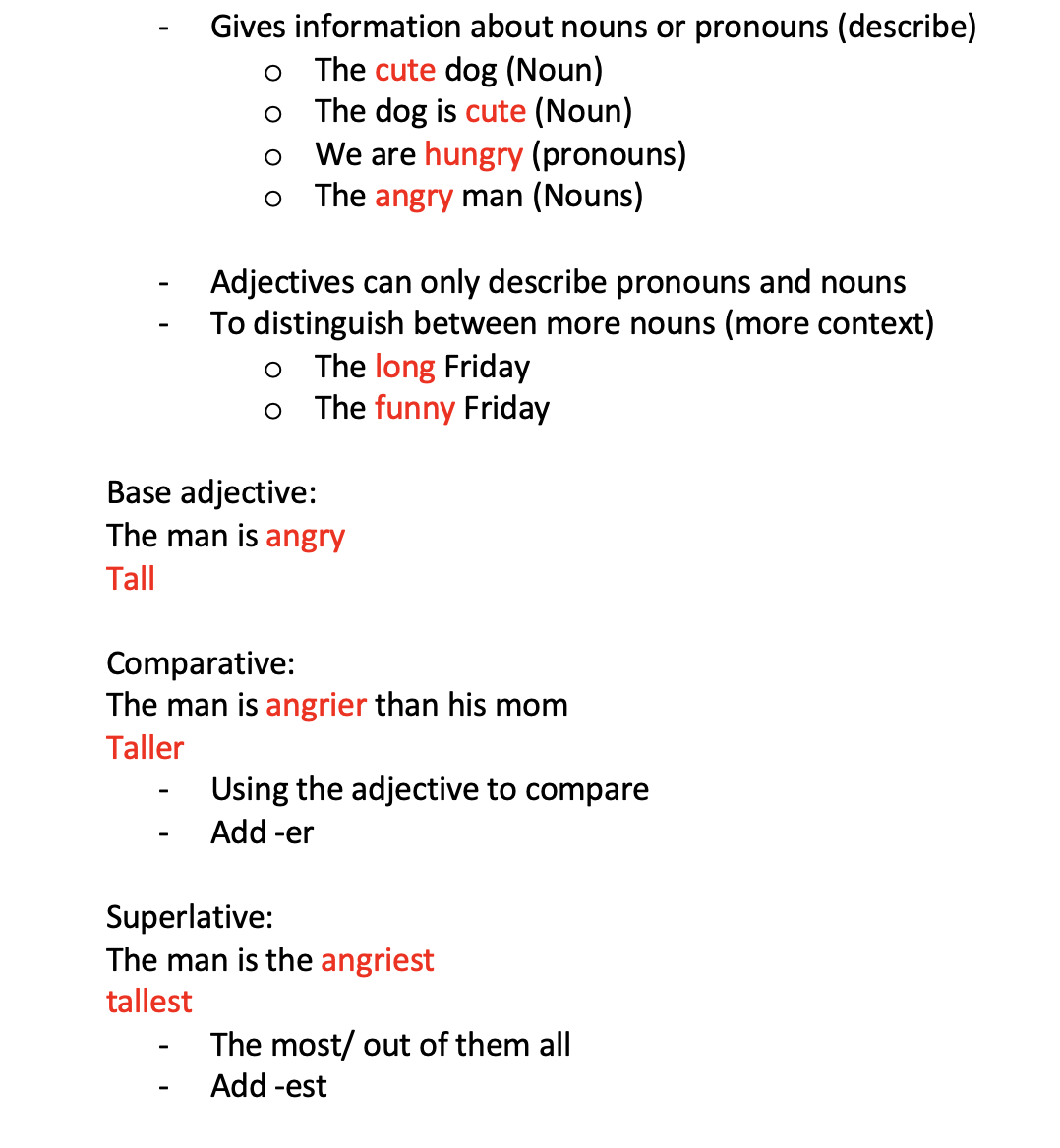
15
New cards
Verb
Present tense, current situation right now
- I walk to school
- It walks to school
Past tense, has already happened
- I walked to school, yesterday
- I walk to school
- It walks to school
Past tense, has already happened
- I walked to school, yesterday
16
New cards
The Infinite - regular verb
The purest form of the verb, without tense or person (form does not change)
English infinitives take a to before the verb
- To be
- To go
- To walk
English infinitives take a to before the verb
- To be
- To go
- To walk
17
New cards
Present simple - regular verb
Tends to be used in general statements or to state attitudes as in: “I don’t trust politicians”
- I/You/We/You(plural)/They walk
- He/She/it walks
- I/You/We/You(plural)/They walk
- He/She/it walks
18
New cards
The present progressive/Present Continuous - regular verb
Known as the Present Continuous, requires the present participle, which is the verb in its infinitive form, walk, with -ing on the end
When the verb is in this form, it requires the auxiliary verb to be to accompany it: the other verb ending remains unchanged - “Walking”
- I am Walking
- You/We/You(plural)/They are walking
- He/She/It is walking
When the verb is in this form, it requires the auxiliary verb to be to accompany it: the other verb ending remains unchanged - “Walking”
- I am Walking
- You/We/You(plural)/They are walking
- He/She/It is walking
19
New cards
The present perfect - regular verb
Requires the auxiliary verb "to have", and the main verb ending (The Simple Past form, walked) remains the same.
Used for an action that took place at some non-specified time
- I/You/We/You(plural)/They have walked
- He/She/Its has walked
Used for an action that took place at some non-specified time
- I/You/We/You(plural)/They have walked
- He/She/Its has walked
20
New cards
The present perfect progressive/ Present Perfect Continuous - regular verb
Known as the Present Perfect Continuous .
Combines Perfect and Progressive: I have been walking.
Describes something that started in the past and is ongoing.
- I have been walking
Combines Perfect and Progressive: I have been walking.
Describes something that started in the past and is ongoing.
- I have been walking
21
New cards
The past simple - regular verb
Simple Past Tense. Used for an action that took place at a specific time
- Walked
- Walked
22
New cards
The past progressive (or continuous) - regular verb
Used to describe a longer action that was taking place in the past
- I was walking to the park when it started to rain
- I was walking to the park when it started to rain
23
New cards
The past perfect - regular verb
Follows the pattern of Present Perfect: I had walked
- I had walked there once, but found it too far
- I had walked there once, but found it too far
24
New cards
The past perfect progressive - regular verb
Follows the pattern of the Present Perfect Progressive, except that the action is set in the past
- I had been walking for hours and still had not reached the mountain when it began to rain
25
New cards
The future tenses - regular verb
Insert will, shall or going to
- I will be walking tomorrow
- I will be walking tomorrow
26
New cards
Irregular verbs
Simple present, base: Go Freeze
Simple past: Went Froze
Past participle: Gone/going Freeze
Bring
Run
Drink
Take
Simple past: Went Froze
Past participle: Gone/going Freeze
Bring
Run
Drink
Take
27
New cards
Preposition
Words that express (temporal, special or otherwise) between a noun or a pronoun and another element in the phrase.
Tells us when or something is in relation to something else
o The man on the platform
o He arrived after dinner
- Time prepositions: before, after, during, at, by, for, since
- Place prepositions: under, over, on, off, though, down, around
- Sometime preposition are two or three words long: Owning to, because of, in spite of, with reference to, in accordance to, except for,
Tells us when or something is in relation to something else
o The man on the platform
o He arrived after dinner
- Time prepositions: before, after, during, at, by, for, since
- Place prepositions: under, over, on, off, though, down, around
- Sometime preposition are two or three words long: Owning to, because of, in spite of, with reference to, in accordance to, except for,

28
New cards
Determiners
Similar to pronouns and adjectives in that they give us information about nouns
Rather than describe nouns they specify them
Some adjectives and pronouns are determiners as are the indefinite and the definite articles (the, a, an)
o Definite article: the (specific person or thing)
Mary took the dog for a walk
The house needs re-decorating
We assume that the reader or listener already knows which
noun we are referring too
Indefinite article: a/an (not a specific person or thing (anyone/ anything)
Mary took a dog for a walk
A house needs decorating
- Unlike adjectives and possessive pronouns, however, they can be separated from the nouns to which they belong “My book”; “Our house”; “The dog”; “That man”
- Other determiners include:
o Demonstratives: this, that, these, those, yonder
o Indefinite determiners: some, few, less, several, many, much, neither
o Numbers: cardinal or ordinal: one or the first
Zero article
- Certain nouns that require neither a definite nor an indefinite article
- Nouns used in this way allow us to generalize about them
o Home is where the heart is
o Anger is a destructive emotion
o Ink will stain your clothes
Rather than describe nouns they specify them
Some adjectives and pronouns are determiners as are the indefinite and the definite articles (the, a, an)
o Definite article: the (specific person or thing)
Mary took the dog for a walk
The house needs re-decorating
We assume that the reader or listener already knows which
noun we are referring too
Indefinite article: a/an (not a specific person or thing (anyone/ anything)
Mary took a dog for a walk
A house needs decorating
- Unlike adjectives and possessive pronouns, however, they can be separated from the nouns to which they belong “My book”; “Our house”; “The dog”; “That man”
- Other determiners include:
o Demonstratives: this, that, these, those, yonder
o Indefinite determiners: some, few, less, several, many, much, neither
o Numbers: cardinal or ordinal: one or the first
Zero article
- Certain nouns that require neither a definite nor an indefinite article
- Nouns used in this way allow us to generalize about them
o Home is where the heart is
o Anger is a destructive emotion
o Ink will stain your clothes
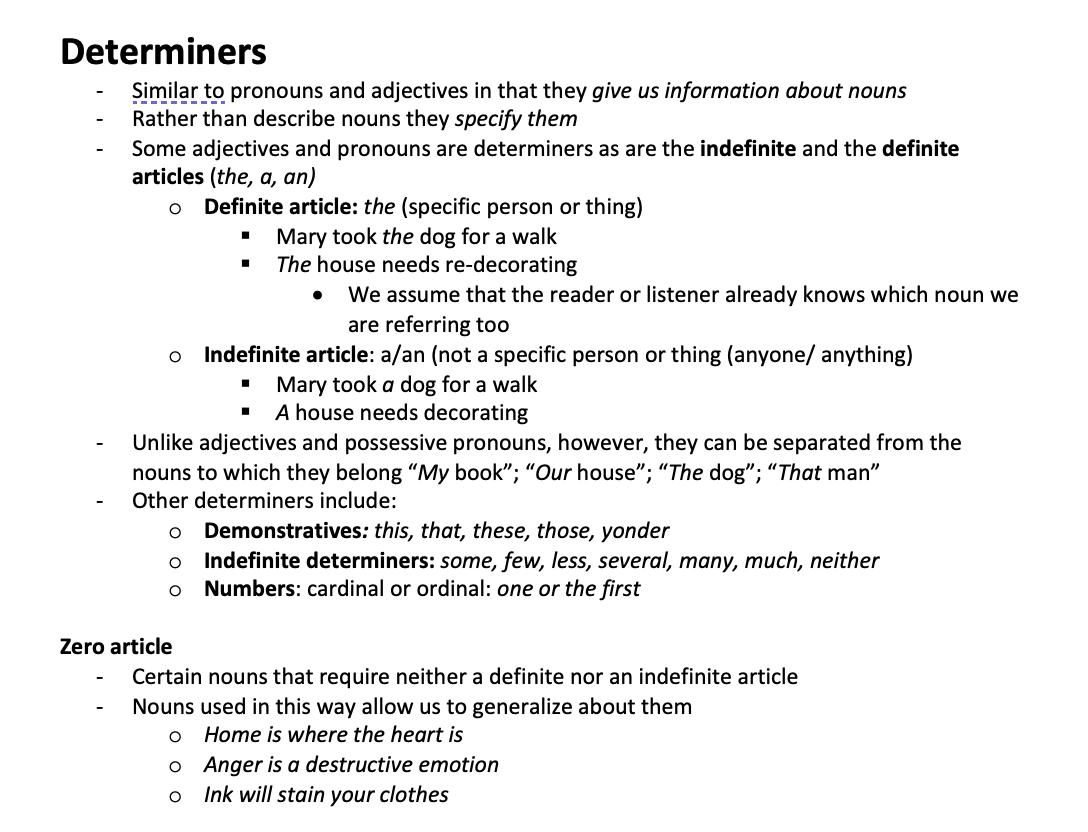
29
New cards
Conjunction
- Although, and, but, when, because, if, or, so, unless and while
30
New cards
Coordinating conjunction
Join together parts of the sentence that have equal weight.
o The list of adjectives that can be joined by and in this way is endless each item will carry equal importance
The most commonly used of these of these is: "and"
o “The boys came home hungry and tired and dirty”
"But" suggest contrast
o “Cycling to work is better for your health but the train is quicker”
"Or" suggest choice
o “I don’t know whether to cycle or get the train this morning”
They are equal
o The list of adjectives that can be joined by and in this way is endless each item will carry equal importance
The most commonly used of these of these is: "and"
o “The boys came home hungry and tired and dirty”
"But" suggest contrast
o “Cycling to work is better for your health but the train is quicker”
"Or" suggest choice
o “I don’t know whether to cycle or get the train this morning”
They are equal
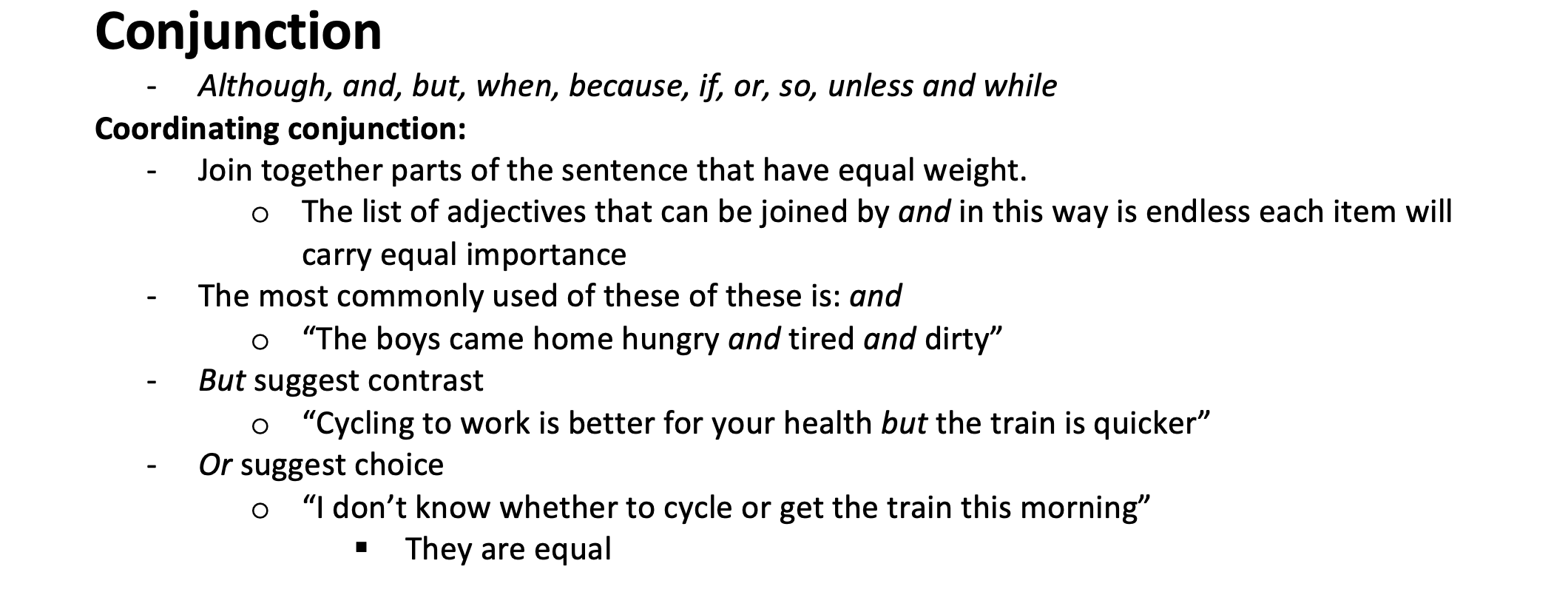
31
New cards
Subordinating conjunction
Join together parts of a sentence that do not have an equal weight: The second part being subordinate to the main part
o “We will go for a walk -when- the snow has melted”
Main: We will go for a walk
Subordinate: the snow has melted
o “We will go for a walk -when- the snow has melted”
Main: We will go for a walk
Subordinate: the snow has melted
32
New cards
Pronouns
Word that stands in for a noun - for instance, to indicate someone or something already mentioned.
Pronouns is the subject of the verb (That is, the person, that thing carries out the action)
- I, you (singular and plural), he, she it, we they
o “He took down the book” (where the book is the object)
Pronouns is the subject of the verb (That is, the person, that thing carries out the action)
- I, you (singular and plural), he, she it, we they
o “He took down the book” (where the book is the object)
33
New cards
Noun phrase
Group of words with a noun and modifiers (something that describe the noun or give more detail to it)
Group of a words that have a grammatical function
Pronoun test:
“The old hairy cat is cute”
You could say “it is cute” instead because it has the same meaning
“A dog that has spots is barking”
That has spots refers to the dog
“A dog that has spots” Is the NP
Is barking is VP
Example
The table is round
The = definite article
Table = noun
Is = verb
Round = adjective
In this case The table would be the noun phrase
Our parrot is singing
Parrot: noun
Our: possessive pronoun
In this case our noun phrase is Our parrot
The old hairy cat is cute
Old, hairy: adjective
The: definite article
Is: verb
Cat: noun
In this case our noun phrase is The old hairy cat
Group of a words that have a grammatical function
Pronoun test:
“The old hairy cat is cute”
You could say “it is cute” instead because it has the same meaning
“A dog that has spots is barking”
That has spots refers to the dog
“A dog that has spots” Is the NP
Is barking is VP
Example
The table is round
The = definite article
Table = noun
Is = verb
Round = adjective
In this case The table would be the noun phrase
Our parrot is singing
Parrot: noun
Our: possessive pronoun
In this case our noun phrase is Our parrot
The old hairy cat is cute
Old, hairy: adjective
The: definite article
Is: verb
Cat: noun
In this case our noun phrase is The old hairy cat
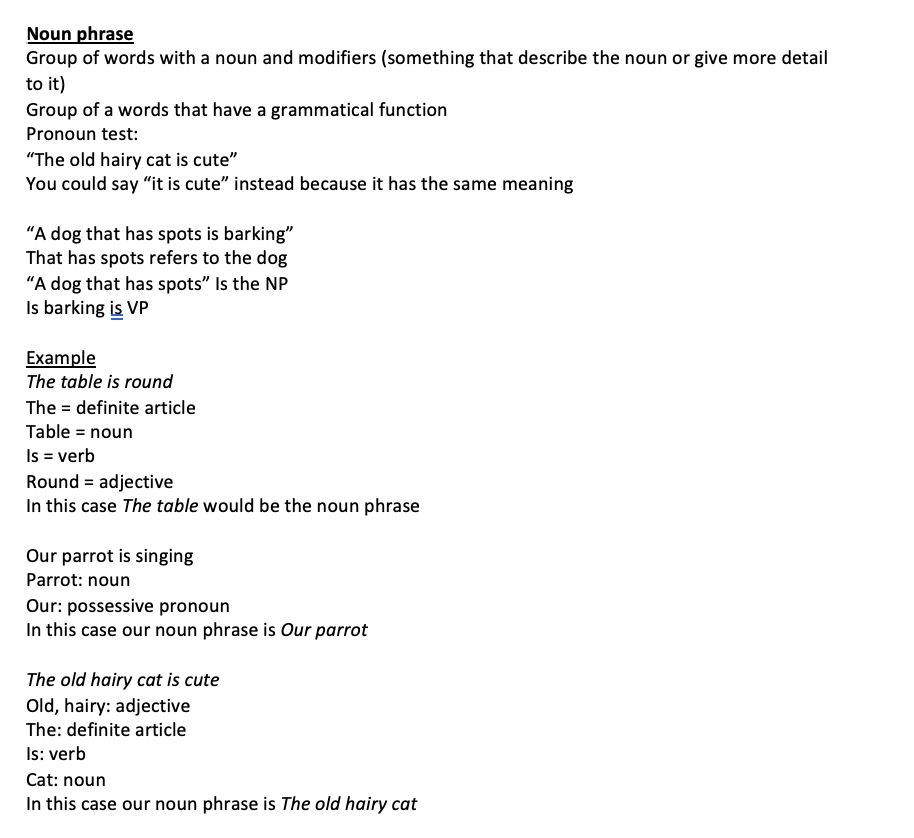
34
New cards
Verb phrase
Group of words with a verb and auxiliary verbs (not the primary verb, but gives us extra information, the one that carry the tense (what time we are in) ex. Be, have, will)
Example:
Mia will work tomorrow
Will, work: Verb (will is the auxiliary)
In this case our noun phrase is Will work
I will have been studying for a wee
Will, have, been, studying: Main verb is studying. Will, have, been is the auxiliary
In this case our noun phrase is Will have been studying
Example:
Mia will work tomorrow
Will, work: Verb (will is the auxiliary)
In this case our noun phrase is Will work
I will have been studying for a wee
Will, have, been, studying: Main verb is studying. Will, have, been is the auxiliary
In this case our noun phrase is Will have been studying
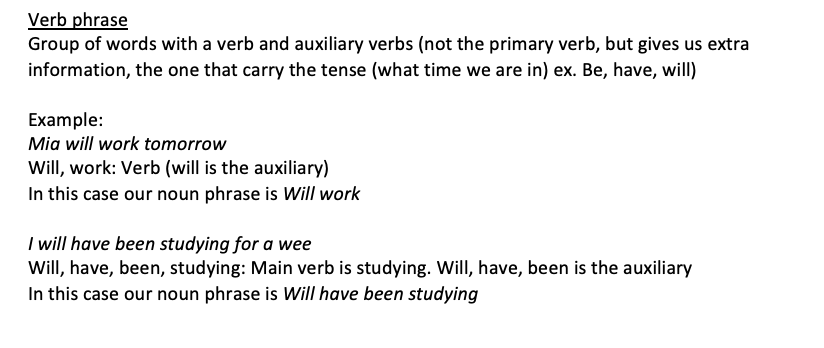
35
New cards
Prepositional phrase
Group of words with a preposition at the start (in the phrase)
- Look at the phrase and see where we have a preposition
Preposition
- Tells us when something Is happening (time) , in the morning it happened
- Tell us where something took place (location)
- Direction of something
Example
I run in the morning
In: preposition
Tells us something about the time
In this case our noun phrase is in the morning
- Within this there is a noun phrase (In the morning) but “In” makes it a prepositional phrase
The keys are under the table
In this case our noun phrase is Under the table
- Look at the phrase and see where we have a preposition
Preposition
- Tells us when something Is happening (time) , in the morning it happened
- Tell us where something took place (location)
- Direction of something
Example
I run in the morning
In: preposition
Tells us something about the time
In this case our noun phrase is in the morning
- Within this there is a noun phrase (In the morning) but “In” makes it a prepositional phrase
The keys are under the table
In this case our noun phrase is Under the table
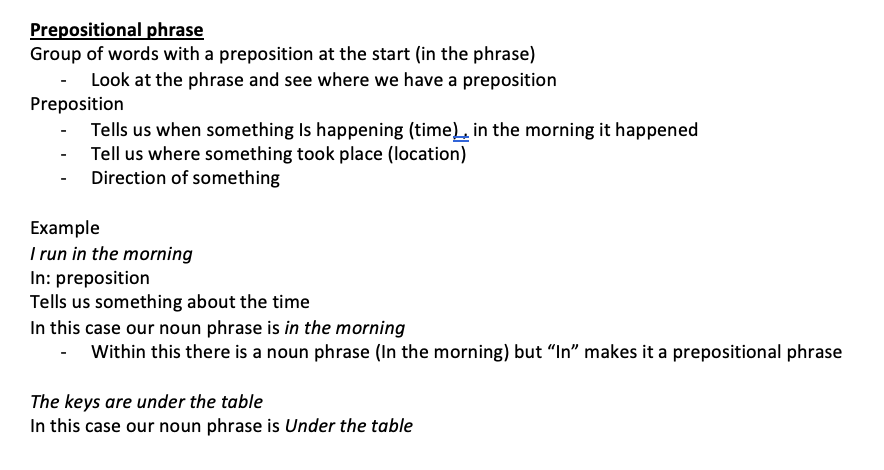
36
New cards
Subject
In a sentence, the subject is the person or thing doing the “verb” or described by it
- Subjects: pronouns, nouns, noun phrases
- General rule: every sentence must have subject + verb, otherwise it’s not a sentence
Ex:
“I walk to school”
Who is doing the walking? “I” is doing the action and is therefore the subject. Pronoun as a subject.
“Mercury is the smallest planet”
What is being described? Mercury is being described as the smallest. Noun as a subject.
Only one person in one million will live to be older than 100 years.
Verb: will (auxiliary), live
Who will live to be older than 100 years? Only one person in one million this sentence is the subject.
The old cat eats a lot
- Verb: eats
- Subject: the old cat
We are so happy
- Verb: are
- Subject: we
The mas will run
- Verb: will (auxiliary), run
- Subject: the man
- Subjects: pronouns, nouns, noun phrases
- General rule: every sentence must have subject + verb, otherwise it’s not a sentence
Ex:
“I walk to school”
Who is doing the walking? “I” is doing the action and is therefore the subject. Pronoun as a subject.
“Mercury is the smallest planet”
What is being described? Mercury is being described as the smallest. Noun as a subject.
Only one person in one million will live to be older than 100 years.
Verb: will (auxiliary), live
Who will live to be older than 100 years? Only one person in one million this sentence is the subject.
The old cat eats a lot
- Verb: eats
- Subject: the old cat
We are so happy
- Verb: are
- Subject: we
The mas will run
- Verb: will (auxiliary), run
- Subject: the man
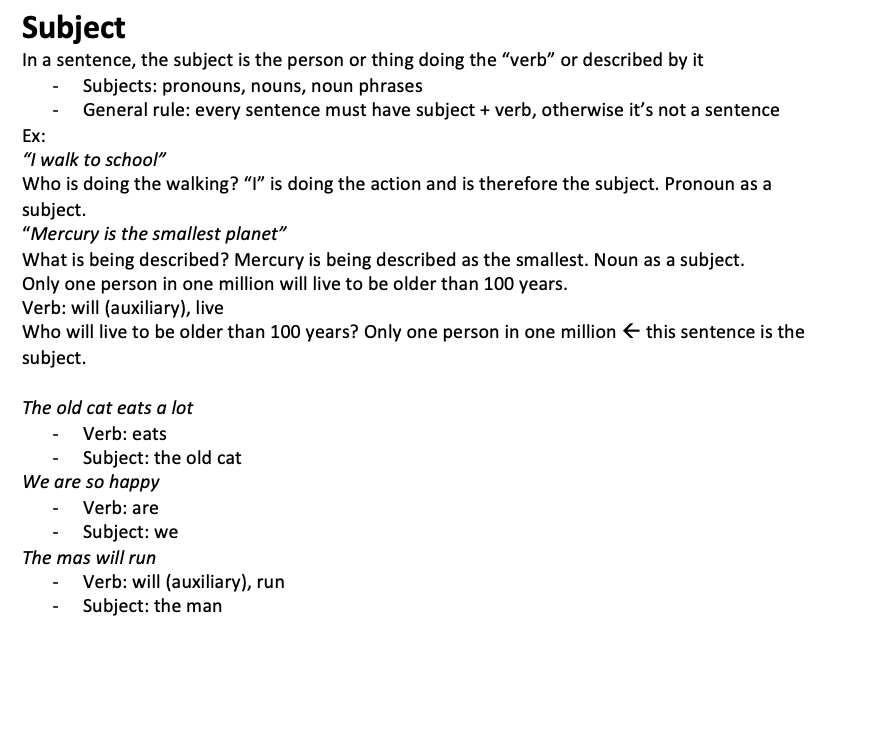
37
New cards
Direct object
Direct object
- Thing that receives the action of the verb
- Undergoing the change/ affected by the verb
o We threw the ball
DO = The ball
o They also eat the tasty fish
DO = The tasty fish
- Thing that receives the action of the verb
- Undergoing the change/ affected by the verb
o We threw the ball
DO = The ball
o They also eat the tasty fish
DO = The tasty fish
38
New cards
Indirect object
If you don’t have a direct object, you don’t have an indirect object
We need a direct object to have a indirect object
- Person or thing receiving the direct object
o He gave her a medal
Her = IO
A medal = DO
o They wrote a letter to him
To him = IO
A letter = DO
We need a direct object to have a indirect object
- Person or thing receiving the direct object
o He gave her a medal
Her = IO
A medal = DO
o They wrote a letter to him
To him = IO
A letter = DO
39
New cards
Subject complement
- Describes the subject
o Can be an adjective or noun phrase), that describes the subject
- Can be: Noun, noun phrase or an adjective
- We need a linking verb
Ex Subject complement:
The man is old
s v c
- old describes the subject
It is a big problem
s v c
Subject complement: a big problem
- Because it describes “it”
o “It” is a subject
- “Is” is the linking verb
English grammar is difficult
S. V. SC
Linking verbs
- Verbs that are linking subjects to its description
o To “Be”/is/ were - is the main linking verb
o “Seem”
o “Become”
o “Smell”
o “Appear”
o “Looks”
- If there is a linking verb, then you have a subject complement
o Can be an adjective or noun phrase), that describes the subject
- Can be: Noun, noun phrase or an adjective
- We need a linking verb
Ex Subject complement:
The man is old
s v c
- old describes the subject
It is a big problem
s v c
Subject complement: a big problem
- Because it describes “it”
o “It” is a subject
- “Is” is the linking verb
English grammar is difficult
S. V. SC
Linking verbs
- Verbs that are linking subjects to its description
o To “Be”/is/ were - is the main linking verb
o “Seem”
o “Become”
o “Smell”
o “Appear”
o “Looks”
- If there is a linking verb, then you have a subject complement
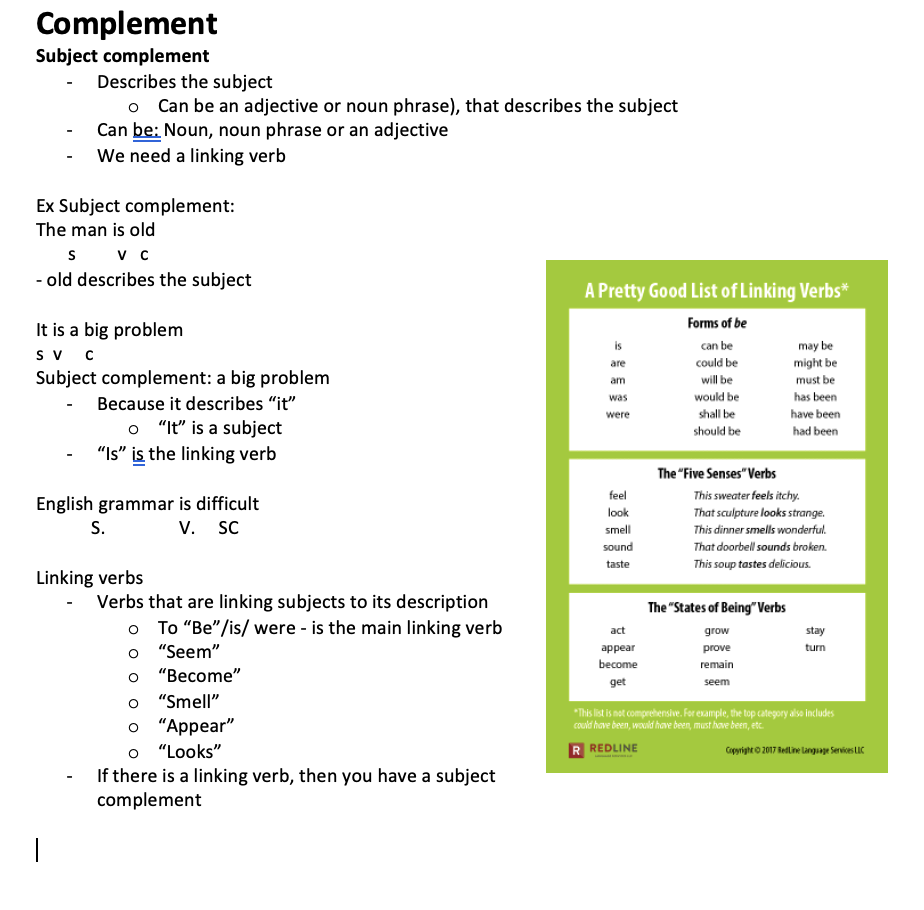
40
New cards
Object complement
It is word that follow the direct object to rename it or state what it has become
- We need a direct object
- If there is a direct object, is it then described
Ex.
It makes her happy
DO: Her, happy states that she has become happy
They painted the car red
DO: the car, red is the OC
Practice makes English grammar easy
S v DO OC
The class wants cake to be their reward
S v DO OC
They called the office
S v DO
- No compliment
The politicians elected maria president
S V DO OC
Verbs that could be the linking:
- Make
- Crate
- Name
- Call
- Elect
- We need a direct object
- If there is a direct object, is it then described
Ex.
It makes her happy
DO: Her, happy states that she has become happy
They painted the car red
DO: the car, red is the OC
Practice makes English grammar easy
S v DO OC
The class wants cake to be their reward
S v DO OC
They called the office
S v DO
- No compliment
The politicians elected maria president
S V DO OC
Verbs that could be the linking:
- Make
- Crate
- Name
- Call
- Elect
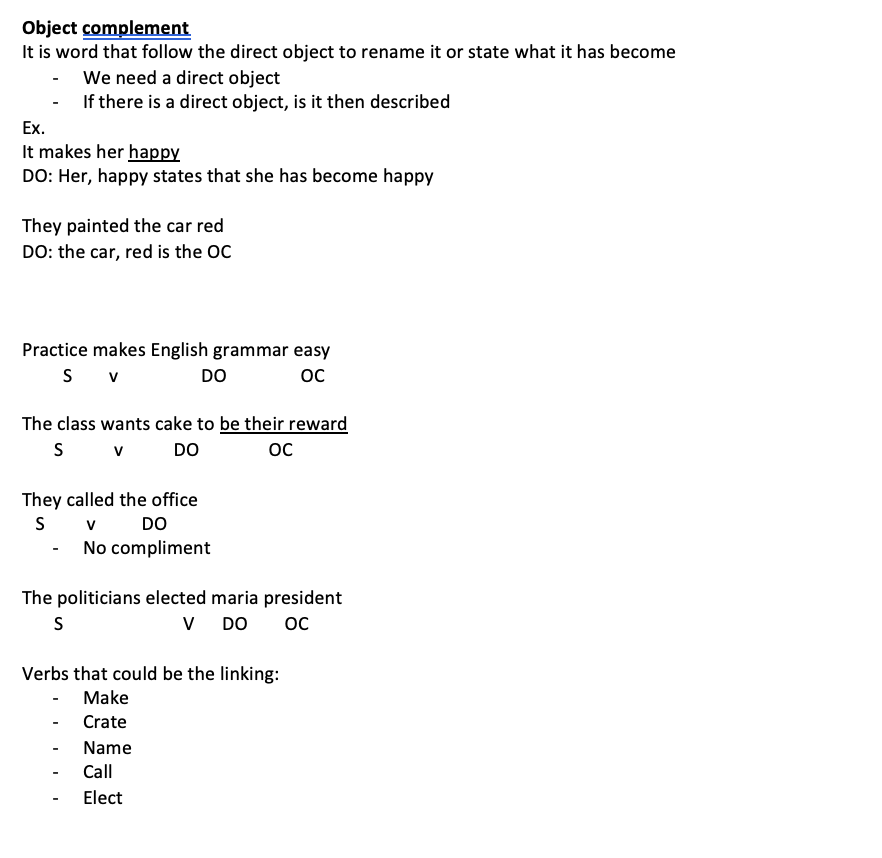
41
New cards
Adverbials
Can be adverbs or prepositional phrases. They tell us about a time, place etc.
They can also give more context to sentences and tells about degree (very)
Ex:
He is running to school
s v A
- Adverbials: to school
Yesterday, she walked into the room
A s v A
- Adverbials: yesterday, into the school
-
They can also give more context to sentences and tells about degree (very)
Ex:
He is running to school
s v A
- Adverbials: to school
Yesterday, she walked into the room
A s v A
- Adverbials: yesterday, into the school
-
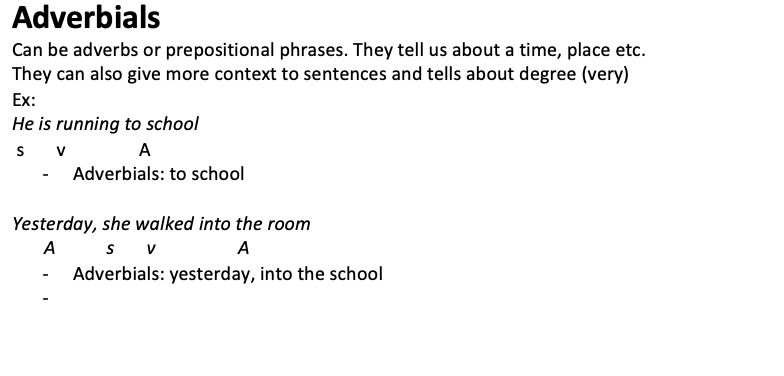
42
New cards
Main clause
- All clauses must have a subject and a verb
- All sentences have at least 1 main clause
o IF you have a subject and a verb more than one you have more clause
Main clause
- Grammatical correct
- Can stand on its own
- If there is a conjunction (and, but)
43
New cards
Subordinate clause
- They do not make sense on their own
- Give extra information to the main clause
- Describe noun, or give information about time and place
- Can function like an adjective, adverb, or noun
Example:
“The dog rushed to the park which is near my house”
Main clause “The dog rushed to the park”
Subordinate clause: “Which is near my house”
The person, who is walking to Germany, is pretty funny
Main clause: The person is pretty funny
Subordinate: Who is walking to Germany
They are running and we are walking
Main clause: They are running, we are walking
Before they talked together, they did not like each other
Main clause: They did not like each other
Subordinate: Before they talked together
Is this the man clause or is this part the man clause that we are looking for?
Main clause: Is this the man clause, is this part the main clause
Subordinate: that we are looking for
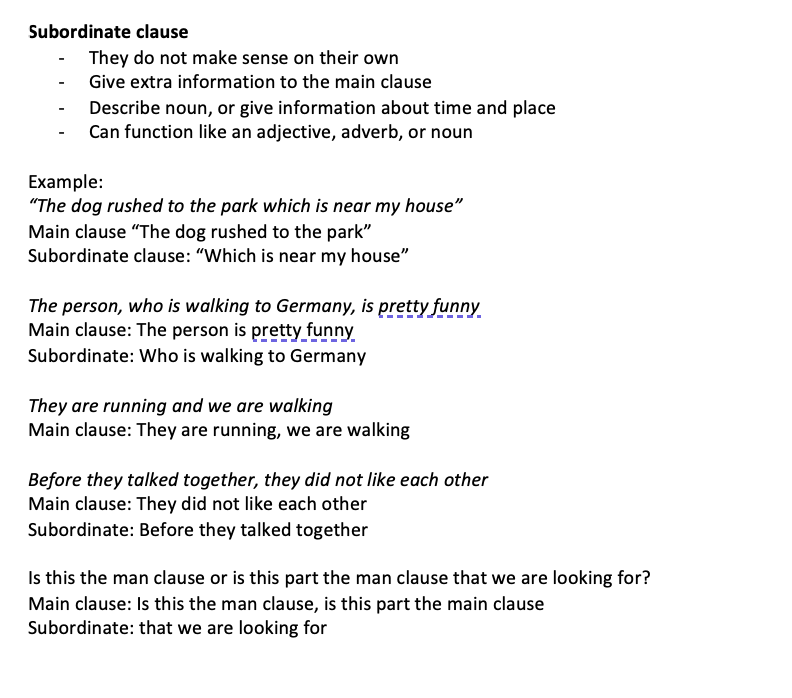
44
New cards
Syntactical descriptors
- S, V, DO, IO, A, SC, OC
1) Describe / write down what is meant by the different syntactical descriptors we have:
- Subject (S), verb (V), direct object (DO), indirect object (IO), adverbials (A), subject complement (SC), and object complement (OC)
Subject = In a sentence, the subject is the person or thing doing the “verb” or described by it, can be pronouns, nouns, noun phrases.
Verb = The action of the sentence
I walk
Subjects and verbs are always in a sentence!
Direct object = thing or person affected by the verb.
I found the book
DO
Indirect object = person or thing receiving the direct object.
He gave her a letter
IO DO
We need a direct object to have an indirect object!
Adverbials = Describe a verb (adverb or prepositional phrases). They tell us about a time, place etc. so, give more information/context.
Subject complement = Words that describes the subject
He is happy
S V SC
Object complement = word that follow the direct object to rename it or state what it has become.
We named him William
S V DO OC
1) Describe / write down what is meant by the different syntactical descriptors we have:
- Subject (S), verb (V), direct object (DO), indirect object (IO), adverbials (A), subject complement (SC), and object complement (OC)
Subject = In a sentence, the subject is the person or thing doing the “verb” or described by it, can be pronouns, nouns, noun phrases.
Verb = The action of the sentence
I walk
Subjects and verbs are always in a sentence!
Direct object = thing or person affected by the verb.
I found the book
DO
Indirect object = person or thing receiving the direct object.
He gave her a letter
IO DO
We need a direct object to have an indirect object!
Adverbials = Describe a verb (adverb or prepositional phrases). They tell us about a time, place etc. so, give more information/context.
Subject complement = Words that describes the subject
He is happy
S V SC
Object complement = word that follow the direct object to rename it or state what it has become.
We named him William
S V DO OC
